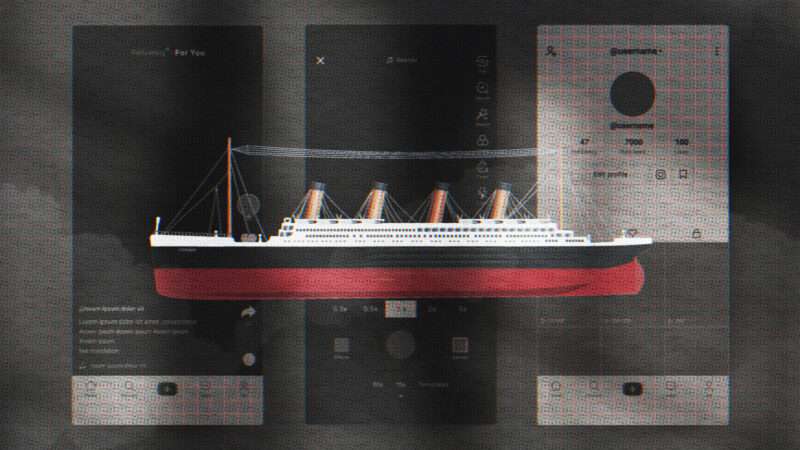
The Titanic never actually sank. Or maybe it did, but not because of an accidental run-in with an iceberg. It was really a dastardly plot by Irish Catholics, or perhaps banker J.P. Morgan or an Egyptian mummy's curse is to blame.
Those—and plenty more—wild conspiracy theories about the disaster that unfolded in the North Atlantic during the early morning hours of April 15, 1912, have been circulating for years, with some starting almost immediately after the Titanic reached the ocean floor.
But now they're also spreading on TikTok, and The New York Times seems convinced that the social media app is a uniquely dangerous place for kids to encounter ideas that they might otherwise have to find in books, in movies, or elsewhere on the internet.
On TikTok, "musty rumors merge with fresh misinformation and manipulated content—a demonstration of TikTok's potent ability to seed historical revisionism about even the most deeply studied cases," the Times' Tiffany Hsu and Sapna Maheshwari declare in a piece about the video site's "Titanic Truthers."
But the story's dramatic framing and its specific targeting of TikTok seem at odds with reality—a problem for any article, but especially one that's supposed to be combating misinformation. Indeed, near the bottom of the piece, Hsu and Maheshwari admit that these TikToks are "just the latest recycling bin for false narratives about the Titanic."
Is there something uniquely dangerous about the way these ideas spread via TikTok? I asked Joseph Uscinski, a political scientist at the University of Miami who has written extensively about conspiracy theories (including in the pages of Reason), whether this is a worrying development.
"No, we should not be worried," says Uscinski. "The ability of social media to turn people into conspiracy theorists is vastly overrated, largely because people don't believe everything they hear and see, and oftentimes, the things they hear and see are things that they sought out purposely because those things match their preexisting beliefs."
If TikTok—or social media in general, or even the internet as a whole—was causing people to believe in more conspiracy theories, researchers would be able to see that trend. Instead, surveys by Uscinski and others have found that, at the mass level, conspiracy theory beliefs tend to be stable over time.
Instead of acknowledging that, the Times article offers a misleading statistic to suggest that social media is rotting kids' brains. Citing research from the Reboot Foundation, Hsu and Maheshwari note that 17 percent of "young Americans who use TikTok for more than an hour a day" were unable to "say definitively that the Earth is round."
That, of course, doesn't mean they ascribe to the silly "flat Earth" theory, just that they don't have a definitive take on the subject—or that they were trolling the pollster. At any rate, the statistic is useless without knowing how many Americans who aren't young and don't use TikTok more than an hour a day might hold similar views. The Times story doesn't provide that context, and neither does the underlying Reboot Foundation report—though the report does say that social media is "probably not" making young people less intelligent.
But here's a 2022 survey conducted by the University of New Hampshire's school of public policy that found 19 percent of American adults either believed the Earth was flat or were unsure about it. Could it be that young TikTok users are actually more well-informed than the general public?
Maybe not. Uscinski thinks the New Hampshire survey might be flawed, too: The question's wording was a bit confusing, which might have led to a higher number of "not sure" responses. Either way, we're talking about fewer than one in five people—and we're talking about a longstanding element of American life.
"There always seems to be a tendency to blame new technologies and forms of communication for longstanding social ills, partially because there is a tendency for people to see the past with rosy hindsight," Uscinski tells Reason. "So when people tell me that conspiracy theory beliefs are worse now than ever before, I usually ask if they are worse now than during the Salem Witch Trials, or the Red Scare?"
The post Is TikTok Really To Blame for <i>Titanic</i> Conspiracy Theories? appeared first on Reason.com.







